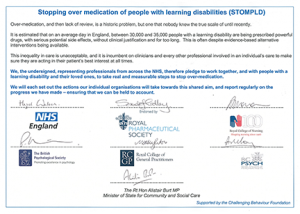Doctors urged to help stop ‘chemical restraint’ as leading health professionals sign joint pledge
New guidance launched today will support prescribing healthcare professionals to review inappropriate prescriptions for people under their care who have a learning disability and/or autism.
The toolkit comes as NHS England and Rt Hon Alistair Burt MP, Minister of State for Community and Social Care, joined forces with five professional bodies and the Challenging Behaviour Foundation (CBF) to pledge sustained action to tackle the over-prescribing of psychotropic drugs to people whose behaviour is challenging.
Multiple psychotropic drug use often starts at a specialist level, which is then passed onto primary care for long-term management. Research published last year found that, in too many cases, these prescriptions are repeated without adequate review.
An estimated 35,000 adults with a learning disability are being prescribed an antipsychotic, an antidepressant or both without appropriate clinical justification. Long-term use of these drugs can lead to significant weight gain, organ failure and, in some cases, death.
The Stopping Over-Medication of People with a Learning Disability (STOMPLD) pledge has been signed by the Roya l Colleges of Nursing, Psychiatrists and GPs, as well as the Royal Pharmaceutical Society, the British Psychological Society and NHS England at a summit in London today.
l Colleges of Nursing, Psychiatrists and GPs, as well as the Royal Pharmaceutical Society, the British Psychological Society and NHS England at a summit in London today.
It commits each to “work together, and with people with a learning disability and their loved ones, to take real and measurable steps to stop over-medication”, and is intended to mark the beginning of a series of actions by the signatories over the coming months.
Professor Sir Bruce Keogh, NHS England’s National Medical Director, said: “Reducing use of powerful drugs whenever we can is a good thing. We have managed this successfully in dementia; it’s now time to bring similar benefits to patients who have a learning disability.”
The new pamphlet, co-designed by NHS England and the Royal College of GPs, will support and encourage family doctors and their teams to review prescriptions of people on their patient list, and ensure that psychotropic drugs are only continued where the person poses a severe risk to the safety of themselves and others, and all other alternatives have been exhausted.
Dr Matt Hoghton, Medical Director for the RCGP Clinical Innovation and Research Centre, said: “Working collaboratively between healthcare professionals and carers is really important in tackling the appropriate use of psychotropic drugs in our patients with learning disabilities, and signing this pledge today is an important commitment to ensuring they receive the best possible care.
“Whilst GPs rarely initiate these medications, they have a key role to play in reviewing and ensuring our patients with learning disabilities are only taking drugs if they need to, and that their records indicate why they are taking them, so this guidance is welcome.”
Research commissioned by NHS England and delivered in three reports from the Care Quality Commission, Public Health England and NHS Improving Quality last year found that:
- There is a much higher rate of prescribing of medicines associated with mental illness amongst people with a learning disability than the general population, often more than one medicine in the same class, and in the majority of cases with no clear justification;
- Medicines are often used for long periods without adequate review, and;
- There is poor communication with parents and carers, and between different healthcare providers.
Dr Ashok Roy, Chair of the Intellectual Disability Faculty at the Royal College of Psychiatrists, said: “Overmedication has been found to be problem faced by some people with learning disability who are prescribed psychotropic drugs without clear evidence of a mental illness, but more for the management of behaviour problems.
“This needs to change, and as part of this we will support evidence-based prescribing, improved monitoring, greater use of psychological and environmental interventions, and a program of medication reduction or discontinuation wherever possible.”
Sandra Gidley, Royal Pharmaceutical Society English Board Chair, said: “For far too long people with learning disabilities have received poor health care.
“This group of patients are frequently prescribed antidepressants, sedatives and mood stabilisers in order to manage episodes of ill-health or challenging behaviour, which are not subsequently reviewed. These medicines can cause serious side-effects, poor health and even premature death.
“This pledge should act as a trigger to all health professionals to ensure that over-medication becomes a thing of the past. People with learning disabilities deserve better. A person-centred review should take place regularly and ideally every time a medicine is changed.”
Professor Peter Kinderman, President of the British Psychological Society, said: “Used appropriately and well supervised, these drugs can play an important role in helping people get through what can be really tough points in their lives and the lives of their families.
“However, they should never be the first option without considering alternatives, or used continually without checking that the individual is still benefiting from them. The BPS is pleased to join this call to action and play our part in tackling this long-term inequality in care for people with learning disabilities.”
Annie Norman, RCN Professional Lead for Learning Disabilities and Criminal justice said: “The RCN has repeatedly highlighted that people with learning disabilities are still being failed by the health care system. It is simply not acceptable that people with a learning disability are being prescribed anti-psychotic drugs without appropriate clinical justification.
“Learning Disability nurses are highly skilled nurses who care and treat people with complex mental and physical needs and can support people without automatically relying on medication by using a whole host of interventions.
“This pledge should be an opportunity for health and medical professionals to work more closely together to provide a more person centred approach to the care of people with learning disabilities, to give them a better quality of life. People with learning disabilities deserve and expect so much better from their health service.”
Individuals and their loved ones who are concerned with a current prescription are encouraged not to stop taking medication immediately, but to consult their doctor or supervising clinician. Information for patients and their families and carers who believe they may be affected is available on the NHS England website (also in easy read). In summary, the advice to patients is as follows:
- Don’t stop taking medicines or change them without professional medical advice first; doing so could be dangerous.
- Speak to the person responsible for prescribing these medicines as soon as possible, and ask for them to be reviewed. This will usually be your GP, specialist doctor, pharmacist or nurse prescriber.
- Please remember:
- not all medicines that are prescribed to treat people with learning disabilities are antipsychotic or sedative medicines – if you have any concerns, please check and speak to the person responsible for prescribing them (GP, specialist doctor, pharmacist or nurse prescriber).
- antipsychotic and sedative drugs can be effective in treating some people with learning disabilities when used appropriately.
The STOMPLD Pledge was signed by the following organisations, and supported by the Challenging Behaviour Foundation.
- Royal College of GPs – Dr Matt Hoghton
- Royal Pharmaceutical Society – Sandra Gidley
- Royal College of Psychiatry – Dr Ashok Roy
- Royal College of Nursing – Ann Norman
- British Psychological Society – Prof Peter Kinderman
- Department of Health – Rt Hon Alistair Burt MP
- NHS England – Hazel Watson
The STOMPLD Pledge reads:
Over-medication, and then lack of review, is a historic problem, but one that nobody knew the true scale of until recently.
It is estimated that on an average day in England, between 30,000 and 35,000 people with a learning disability are being prescribed powerful drugs, with serious potential side effects, without clinical justification and for too long. This is often despite evidence-based alternative interventions being available.
This inequality in care is unacceptable, and it is incumbent on clinicians and every other professional involved in an individual’s care to ensure they are acting in their patient’s best interest at all times.
We, the undersigned, representing professionals from across the NHS, therefore pledge to work together, and with people with a learning disability and their loved ones, to take real and measurable steps to stop over-medication.
We will each set out the actions our individual organisations will take towards this shared aim, and report regularly on the progress we have made – ensuring that we can be held to account. 
